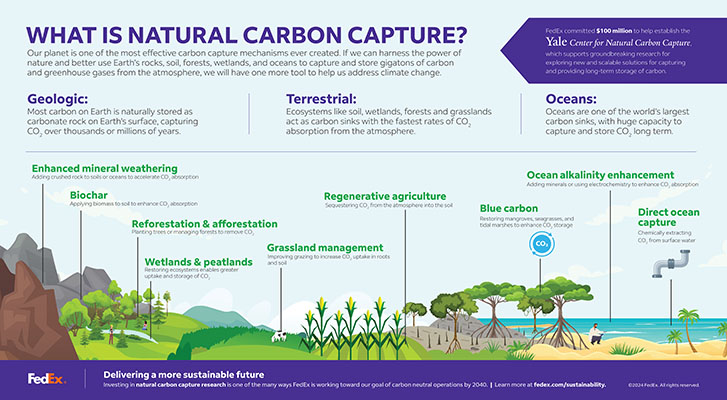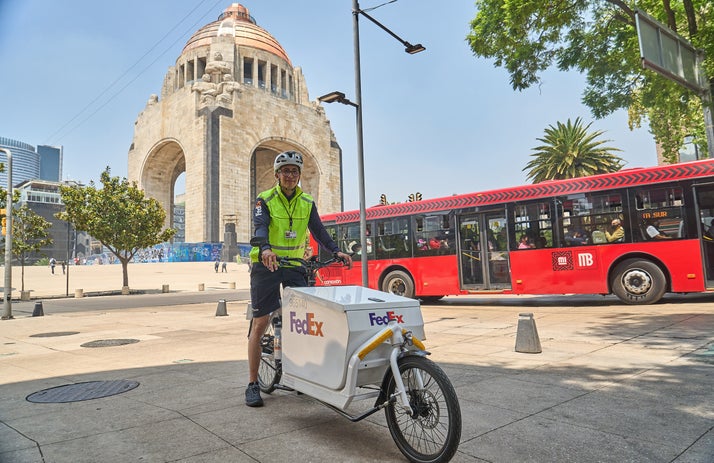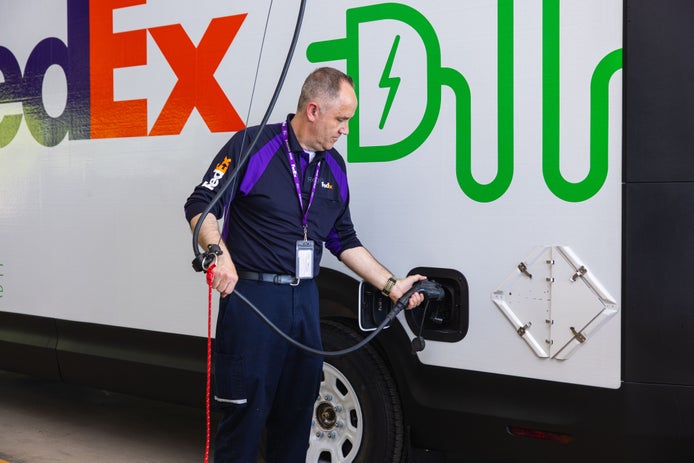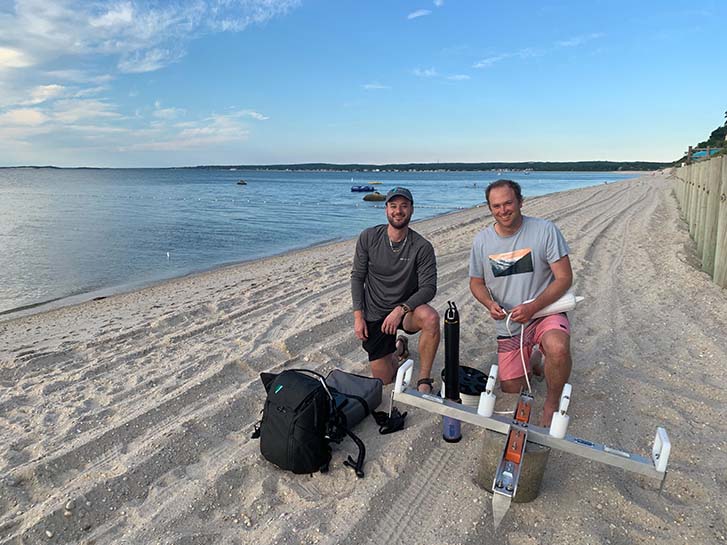Driving change around the world
Taking action through collaboration
To advance our shared journey toward a more sustainable future, FedEx collaborates with universities, climate tech accelerators, conservation non-profits, investment funds, and other stakeholders to scale future solutions and support carbon reduction.
Natural carbon capture
Planet Earth is one of the most effective carbon capture mechanisms ever created. If we can harness the power of nature and better use earth’s forests, rocks, soil, and oceans to store greenhouse gases from the atmosphere, we will have one more tool to help us address climate change.
To accelerate the science needed to find scalable solutions that can permanently capture and store carbon, FedEx committed $100 million to help establish the Yale Center for Natural Carbon Capture. Now in its third year, the Center is researching carbon sequestration with the goal of developing natural, long-term carbon removal solutions across biological, geological, and industrial mediums.
Since 2021, Yale has recruited four globally recognized faculty members and capitalized on the cutting-edge research of over two dozen existing Yale faculty, giving scientists the resources and funding needed to find lasting natural solutions. Yale has already begun to disseminate research findings that could one day lead to the reduction of gigatons of carbon per year.
“Addressing climate change is a complex challenge that demands urgent action, and natural carbon capture strategies will be one key part of that action. Through the creation of the Yale Center for Natural Carbon Capture, we aim to develop measurable carbon capture strategies to help offset carbon emissions globally.”
– Dr. Ingrid C. "Indy" Burke
Dean of the Yale School of the Environment
“Addressing climate change is a complex challenge that demands urgent action, and natural carbon capture strategies will be one key part of that action. Through the creation of the Yale Center for Natural Carbon Capture, we aim to develop measurable carbon capture strategies to help offset carbon emissions globally.”
– Dr. Ingrid C. "Indy" Burke
Dean of the Yale School of the Environment
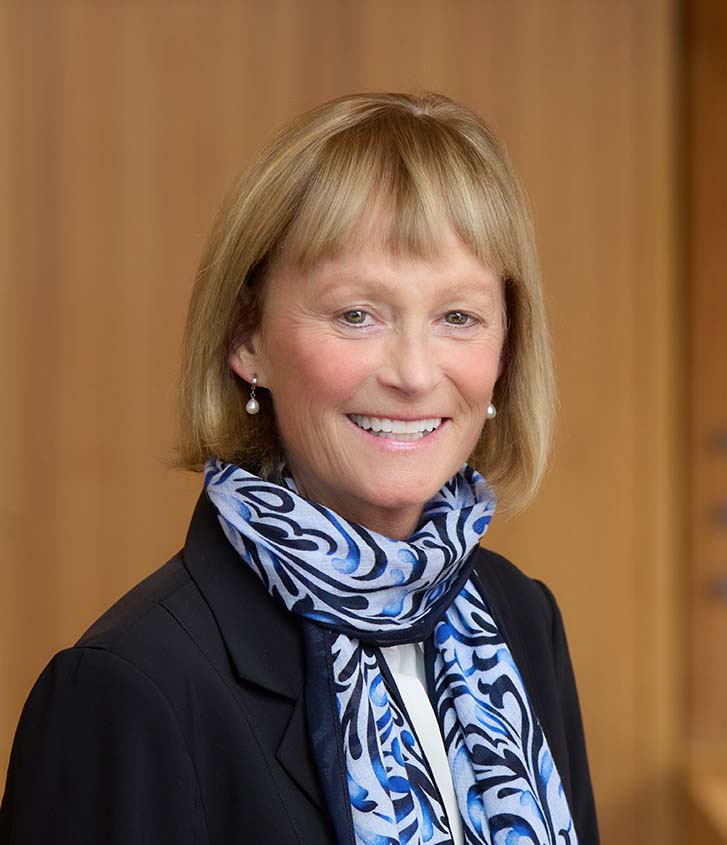


What is natural carbon capture?
Carbon capture, or carbon dioxide removal (CDR), is any activity initiated by humans that removes CO2 from the atmosphere and durably stores it in geological, terrestrial, or ocean reservoirs or in products.
Natural carbon capture utilizes and takes inspiration from nature’s biological and geological processes – carbon cycles in forests, rocks, soil, oceans, and other natural systems – to absorb and store carbon dioxide from the atmosphere.
Sustainable Logistics
Through the Sustainable Logistics pillar of FedEx Cares, we focus on expanding sustainable transportation in cities to help reduce congestion and emissions, scaling innovative climate solutions by accelerating research and technology, and inspiring conservation and team member volunteerism in local communities around the world.
Transforming transportation
A collaboration between FedEx and World Resource Institute Ross Center for Sustainable Cities, the Mobility & Accessibility Program (MAP) is transforming public transportation in Mexico, Brazil, India, and China. Since 2010, MAP has impacted over 20 million people and avoided over 1 million MT CO2e, delivering urban transportation solutions that save millions of people time, ease congestion, create safer streets, reduce pollution, and make access to jobs and markets more equitable.
FedEx also provides expertise in transportation technology, electric vehicles, and driver safety, merging it with the innovative research and global network of the WRI Ross Center.
Advancing vehicle electrification in the U.S. & Canada
Large fleet operators like FedEx have already begun to switch to low-carbon and electric commercial vehicles with the uptake expected to rise over the next 25 years. However, the adoption of zero-emission medium- and heavy-duty vehicles is at risk of stalling largely because the deployment of charging infrastructure has not kept pace.
To support the transition in the U.S., FedEx has invested in RMI’s new GridUp data platform, a powerful tool that will inform utilities, energy regulators, and others on how to proactively locate, strengthen and upgrade charging infrastructure. In collaboration with the Pembina Institute, RMI will also pilot the tool for the Greater Toronto Area to explore the potential for its use in Canada.
Accelerating climate innovation
Bringing new climate tech innovations to market can be complex and expensive. Third Derivative (D3), an RMI program supported by FedEx, accelerates climate tech startups with breakthrough ideas through a unique, climate tech accelerator program. Entrepreneurs who participate in RMI cohorts access expertise and capital that is provided to help them go.
Additionally, alongside some of the world’s largest institutional investors and nearly 30 corporations, FedEx participates in the TPG Rise Climate fund, one of the world’s largest private equity funds dedicated to investing in and scaling climate solutions around the world.
